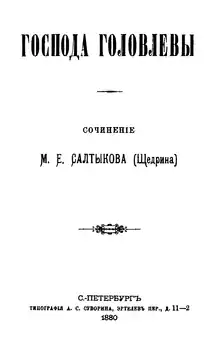The Golovlyov Family
The Golovlyov Family (Russian: Господа Головлёвы, romanized: Gospoda Golovlyovy) is a novel by Mikhail Saltykov-Shchedrin, written in the course of five years, first published in 1880 by Alexey Suvorin's publishing house, and generally regarded as the author's magnum opus.[1]
 First edition | |
| Author | Mikhail Saltykov-Shchedrin |
|---|---|
| Original title | Господа Головлёвы |
| Country | Russia |
| Language | Russian |
| Publisher | Otechestvennye Zapiski |
Publication date | 1880 |
The novel is divided into 7 chapters. The first five were initially published as a series of short stories, part of a cycle called The Well-Meant Speeches (Благонамеренные речи, 1875–1876) in Otechestvennye Zapiski. In 1876 Saltykov-Shchedrin united all the parts into one novel and added two more chapters to it, which appeared in the same magazine. The revised version of the novel came out as a separate edition in 1881.[2]
Publication history
- The Family Trial (Семейный суд, Semeinyi sud). – Otechestvennye Zapisky, 1875, No.10, as "The Well-Meant Speeches. XIII. The Family Trial"
- As Relatives Do (По-родственному, Po-rodstvennomu). – Otechestvennye Zapisky, 1875, No.12, as The Well-Meant Speeches. XVII. As Relatives Do"
- A Family Resume (Семейные итоги, Semeinye itogi). Otechestvennye Zapisky, 1876, No., as "The Well-Meant Speeches XVIII. A Family Resume"
- Dear Niece (Племяннушка, Plemyannushka). Otechestvennye Zapisky, 1876, No.5, as "The Well-Meant Speeches. Before the Escheat"
- The Escheated One (Выморочный, Vymorochnyi) – Otechestvennye Zapisky, 1876, No.8 as "The Well-Meant Speeches. The Escheated One"
- Forbidden Family Joys (Недозволенные семейные радости, Nedozvolennye semeinye radosti). – Otechestvennye Zapisky, 1876, No.12, as "Family Joys"
- The Account (Расчёт, Raschyot). – Otechestvennye Zapisky, 1880, No. 5, as "The Decision. The Last Episode of the Golovlyov Chronicles"
Characters
- Vladimir Mikhaylovich Golovlyov, head of the family. "From early years known for his good-for-nothing, carefree nature", according to the author. "Spent most of his time in a cabinet, imitating the singing of blackbirds, roosters and such and amused himself with writing what he termed 'liberated verses' and what became the object of hatred for his wife... [He] hated his wife with great sincerity which included, though, a strong portion of cowardice."
- Arina Petrovna, "a woman of about sixty but still spry, and used to living according her own will". Quite intimidating, she rules uncontrollably the vast Golovlyov estate, lives alone and almost ascetically, befriends none of the neighbours, is kind to local authorities and demands from children that they be so tame as ask themselves each time: "what would mummy say of this?"
- Stepan Vladimirovich, the eldest son, known as "Styopka the Nitwit". "From early years he found himself among the unloved ones and got used to either be a pariah or to play a jester... Unfortunately he was a gifted, utterly impressive guy. From his father he inherited a mischievous character, from his mother the ability to quickly guess other people's weaknesses."
- Anna Vladimirovna, the daughter. Caused embarrassment to Arina Petrovna by eloping from the estate with a cornet and returning two years later without money but with two twin daughters. Three months on, Anna died.
- Porfiry Vladimirovich, the novel's main character, known from childhood by three names: "Little Judas", "Bloodsucker" and "Sincere Boy", all given to him by Styopka the Nitwit. "From early childhood he loved to coax affection from his "dearest friend mammenka", to secretly kiss her shoulder and to report on others from time to time... Even then Arina Petrovna treated suspiciously her son's attempts to soften her up. Even then his eyes' hard look seemed to her mysterious and she couldn't guess what exactly was in it, venom or respect."
- Pavel Vladimirovich, Porfiry's brother and his antipode. "That was a total embodiment of a creature unable for any action. Even from childhood he showed no eagerness towards learning or socializing through games but preferred to stay alone, shying people. He would get himself into a corner, puff himself up and start fantasizing. Like, he'd imagine himself having eaten too much oatmeal so that his legs became thin and he'd be freed from school." – M.E.Saltykov-Shchedrin. The Golovlyov Family.
- Vladimir and Pyotr, the sons of Porfiry Vladimirovich. Vladimir commits suicide; Pyotr dies on his way to exile for embezzlement.
- Anninka and Liubinka, the twin daughters of Anna Vladimirovna. Following the death of their mother, brought up by Arina Petrovna. Once grown up, they become provincial actresses.
Synopsis
In the mid-19th century old-fashioned estate based on serfdom laws and traditions, tough and shrewd Arina Petrovna tries her best to make her realm prosper and even expand – despite unwillingness of her husband and three of her four children to lend helping hands... Ten years on, serfdom abolished, and now Porfiry-Yudishka, the epitome of a corrupt, cruel hypocrite, becomes the heir to the estate. Dullness and horrors of life, spent in destroying everybody around him, finally makes him to slowly realize things went somehow wrong. Half-mad, apparently, he goes to the cemetery to "ask for forgiveness" from his mother Arina Petrovna, and dies somewhere along his way, his frozen corpse found the next day.[3]
Screen adaptations
- 1933 — Yudushka Golovlyov, director Alexander Ivanovsky.
- 2010 — The Golovlyov Family, director Alexander Yerofeev.
References
- Prozorov, V.V. (1990). "М.Е.Saltykov-Shchedrin". Russian Writers. Biobibliographical Dictionary. Vol 2. Ed. P.A.Nikolayev. Moscow, "Prosveshcheniye" Publishers. Retrieved 2012-03-01.
- Goryachkina, M.S. Selected Works by M.E.Saltykov-Shchedrin. Commentaries. Moscow. Khudozhestvennaya Literatura, 1954. P.593
- Kharlamova, R.A. "Gospoda Golovlyovy". Classics in Brief (site) // World Literature Masterpieces in Brief. Russian Literature in the 19th Century. Ed. by V.I.Novikov. Moscow. Olymp AST Publishers. 1996. P.832. Retrieved 2012-03-01.